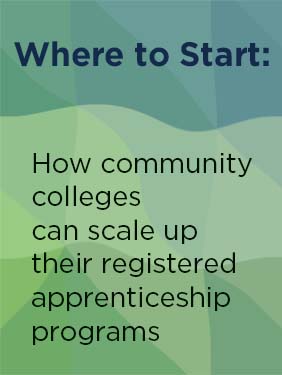
CTE Apprenticeships
This project has been completed and is no longer active.
However, we hope you are able to utilize its resources.
Overview
Across the United States, 120 jobs have been created during the recovery (February 2010-November 2014) for every 100 jobs lost during the recession (December 2007-January 2010) (Fogg, Haington, Khatiwada, 2015). However, Illinois ranks 46th among the 50 states in new job creation, with a recovery rate of just 67% (Fogg et al., 2015). Illinois youth consisting of both teens (16-20 years) and young adults (20-24 years) saw a drastic decrease in employment rates that started in 2001, substantially before the recessions and from which they have not recovered. On average, the employment rate of teens, in Illinois, from 2011-2013 was 27.6%, a reduction of 21.8% from the average rate for 1998-2000 (Fogg et al., 2015). During the same time periods, young adults in Illinois, had an employment rate of 60.2%, a reduction of 12.9% from the average rate from 1998-2000 (Fogg et al., 2015). Further, unemployment is substantially higher among minority and low-income youth, serving to reinforce segregation of communities and greatly reduces the potential for social mobility. Specifically, in Chicago there is a striking relationship between communities that feature high proportions of Black, Latino, and low-income individuals and high rates of unemployment among youth (Cordova, Wilson, & Morsey, 2016).
Apprenticeships may serve as an effective strategy for improving employment among youth and young adults, especially for underserved populations, little is known about the extent to which apprenticeships are currently integrated into Career and Technical Education (CTE) programs in Illinois or in Chicago. To help facilitate future solutions to the unemployment issues faced by youth and young adults, the Office of Community College Research and Leadership (OCCRL) is conducting a study of CTE Apprenticeships in the state of Illinois, with a focus on CTE Apprenticeship programs in the Chicago area.
Goals
This baseline study is an environmental scan that is designed to describe the utilization of CTE apprenticeships in Illinois, the CTE programs these apprenticeships are embedded in, and the student populations engaged in these apprenticeships. Further, this study will examine the potential of apprenticeships as a strategy to improve employment prospects for youth and young adults, as well as, supports and barriers to scaling apprenticeships, as perceived by CTE faculty providing academic instruction in apprenticeship programs. Finally, this study will serve as a baseline for future research, by providing a clear picture of existing usage of apprenticeships and illustrating the potential to scale apprenticeships as a strategy to improve youth employment prospects for underserved minority and low-income youth.
Research Questions
OCCRL’s Illinois CTE Apprenticeships study will answer the following guiding research questions.
- To what extent are apprenticeships currently embedded in CTE programs in Illinois overall, and in Chicago specifically?
- What are the characteristics of CTE programs that have apprenticeships embedded in them?
- How are the apprenticeships within CTE programs structured? What are the requirements for entry into, participation in, and completion of these apprenticeships?
- What are the demographics of students who are enrolled in CTE programs with apprenticeships embedded in them?
- What is the relationship between apprenticeship and youth employment, as perceived by faculty of CTE programs with apprenticeships?
- What factors do faculty identify as being supportive or creating barriers to the potential to scale apprenticeships in CTE programs?
Further, this study highlights the potential of apprenticeships as a strategy to improve employment prospects for youth, as well as, supports and barriers to scaling apprenticeships, as perceived by CTE faculty providing academic instruction in apprenticeship programs. Finally, this study will serve as a baseline for future research, by providing a clear picture of existing usage of apprenticeships and illustrating the potential to scale apprenticeships as a strategy to improve youth employment prospects for underserved minority and low-income youth.
Resources

Chicago College and Career Advising Credential
Those who work with youth and offer advice on their education and career plans will find the Chicago College and Career Advising Credential (CCCAC) to be a useful interactive cohort training process that lets participants practice youth-centered coaching strategies and hear guest speakers discuss varied postsecondary pathway options. Educators can also utilize tools that will help youth explore their passions, examine how racial inequities affect coaching, and do much more to effectively assist the lives of younger people. The training is designed for adults who work with youth in such places as schools, organizations, and the community. Typical CCCAC teachers are youth coaches, school counselors, faith leaders, and after-school instructors. Learn more.
‘Choosing a Post-Secondary Pathway: Apprenticeships’ video
This short video is designed for high school students who are unsure about what they want to pursue as a career or educational path following graduation. Apprenticeships might be a viable option for some newly graduated high school youth, particularly those who are seeking certification in a specific field, those needing income right away, those wanting hands-on experience, or those wanting a job after completing a program. The video describes the many benefits of apprenticeships, which are paid learning and training opportunities, as well as the up-front costs such as application fees, union dues, and uniforms. Watch the video.
Podcasts

Where to Start: How Community Colleges Can Scale Up Their Registered Apprenticeship Programs
Episode 15, February 15, 2018
The purpose of the episode is to bring together community colleges and other partners who are working to scale up their registered apprenticeships. This informative panel includes Matthew Feuerborn the Dean of Career Technologies Division at Kishwaukee College, Dr. Rebecca Lake the Dean of Workforce and Economic Development at William Rainey Harper College, Dr. Henry Bohleke the Dean of The School of Business and Technology at Triton College, and Joshua Seeberg the Midwest Manager of the German American Chamber of Commerce’s Skills Initiative. The panel was hosted by Dr. Anjale Welton and Devean Owens.
Additional Resource




